Minister Faust's Blog, page 8
January 3, 2017
SHAWNA LEMAY ON BEAUTY, CONCISION, ACCESSIBILITY, AND HOW SHE MADE $1000 IN ONE YEAR FROM POETRY (MF GALAXY 101)
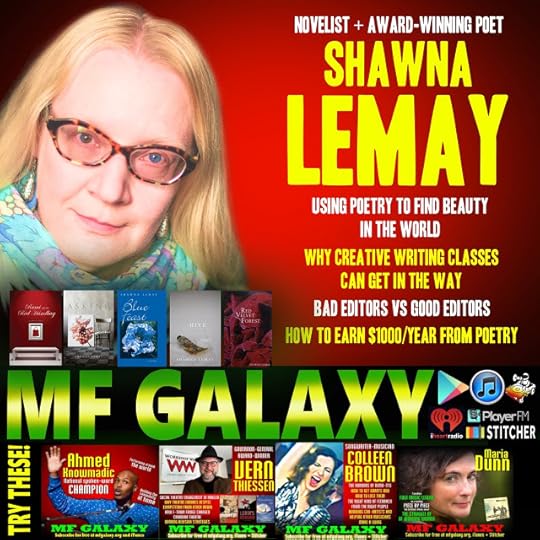 POETRY AS A DAILY PRACTICE IN SEARCH OF BEAUTY, WHY CREATIVE CLASSES FAIL, BAD EDITORS, BEING AN INTROVERT WHO PERFORMS
LISTEN/DOWNLOAD
POETRY AS A DAILY PRACTICE IN SEARCH OF BEAUTY, WHY CREATIVE CLASSES FAIL, BAD EDITORS, BEING AN INTROVERT WHO PERFORMS
LISTEN/DOWNLOAD “Shawna Lemay is the author of the recently released novel, Rumi and the Red Handbag which made Harper’s Bazaar’s #THELIST (must-reads for Fall 2015), the “Most Anticipated” list on the popular Canadian book website, 49th Shelf, and was selected for Maria Shriver's fall reading club. Nathalie Atkinson chose Rumi and the Red Handbag for Fall's Must-Read Fashion Books in the Globe and Mail.
“She has also written six books of poetry, a book of essays, and an experimental novel titled, Hive, which is about the possibility of the existence of a woman art forger. All the God-Sized Fruit, her first book, won the Stephan G. Stephansson Award and the Gerald Lampert Memorial Award. Calm Things: Essays was shortlisted for the Wilfred Eggleston Award for Non-Fiction. She has an M.A. in English from the University of Alberta. She writes a weekly blog titled, Calm Things.
“Rumi and the Red Handbag follows the lives of Shaya and Ingrid-Simone, working together one winter at a second- hand clothing shop. Theodora’s Fine Consignment Clothing shop becomes a small world where Shaya, an academic who abandoned studying the secrets of women writers, finds in Ingrid-Simone a reason to begin writing again, on scraps of paper and post-its. Fresh, unique and intelligent, Rumi and The Red Handbag is a journey to the Museum of Bags and Purses in Amsterdam, a journey to find Rumi, the soul, and the secret hidden in a red handbag.”
Lemay joined me live onstage at Authorpalooza 2 at Cha Island Tea Company in Edmonton’s Old Strathcona district on December 2, 2014. She talked about:
How to make poetry accessibleWhere creative writing classes go wrongThe critical importance of condensingEditors—when they hurt, and when they helpAnd how she made up to $1000 per year at poetryBut we began by discussing poetry as a daily practice and why she is compelled to create verse.
LISTEN/DOWNLOAD
shawnalemay.net
transactionswithbeauty.com
soundcloud.com/shawna-lemay
SUBSCRIBE FOR FREE ON iTUNES
SUBSCRIBE FOR FREE ON iHEARTRADIO
SUBSCRIBE FOR FREE ON PLAYER FM
SUBSCRIBE FOR FREE ON STITCHER
SUPPORT MF GALAXY ON PATREON
FOR MORE INFORMATION + LINKS
Published on January 03, 2017 20:37
December 7, 2016
BABYLON 5 REVISITED WITH J. MICHAEL STRACZYNSKI + MIRA FURLAN (MF GALAXY 100)
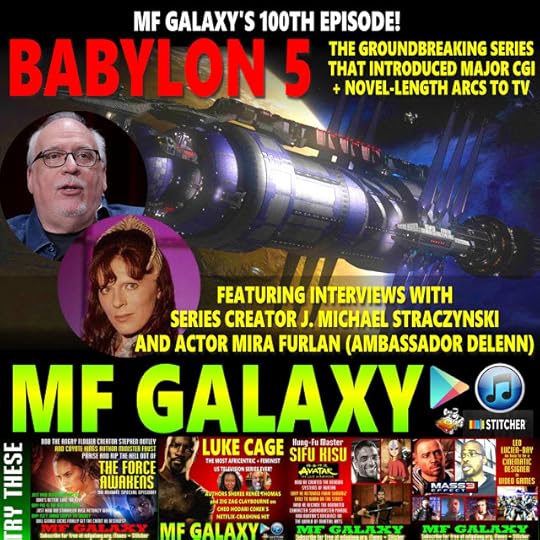
LISTEN/DOWNLOAD
SF can attempt to predict the future, but since Jonathan Swift invented SF with Gulliver’s Travels, an adult political satire that I’d call the original Star Trek, SF has delivered its most enduring and provocative works by analysing the ethical content of the present. But Star Trek became so dominant on US TV through reruns and then resurrection as Star Trek: The Next Generation that it became a force stifling creativity.
The boldest, most innovative, and most influential counter to Star Trek dominance was Babylon 5, the 1993 to 1998 series that introduced the longform story arc with a predetermined beginning, middle, and end to US television. Set in the twenty-third century, the story was of the fifth and final Babylon station, a galactic UN created to end the cataclysmic wars and colonisations in which the cerebral and spiritual Minbari had nearly annihilated Humans, the humanoid Centauri whose empire was in advanced decline, and the reptilian and vengeful Narn who had thrown off Centauri subjugation.
Also involved were two mysterious races: the Vorlons, so alien they could barely be understood, and a shadowy race whose existence was unknown to most species, even while their power soon would be. Mixed into the five-year story arc were queer characters, old and new human religions, a Jewish funeral, a species change, political assassinations, allegories for racism, and the rise of fascism on Earth.
Babylon 5 offered stakes that Star Trek never had, and better yet, played them out for five seasons to results that television had never attempted. It was a long-overdue revival of science fiction TV.
From 1987 to 1994, Star Trek: The Next Generation had presented a 24th Century humanity that, by means unexplained, had stripped itself of its most enduringly toxic social and individual problems. In the Next Generation world, humans didn’t wage war against other humans, did not practice labour, racial, or sexual oppression or exploitation, or destroy ecosystems. The Next Generation presented a future in which “we”—the assumed Euro-American audience for whom the show was created—could do no wrong as a society; only aberrant individuals could cause suffering.
So the major sources of misery, degradation, and tyranny were alien societies. Given that Star Trek’s major social allegory was that the Federation, or at least humanity, was the United States, and that the Klingon Empire was the Soviet Union, the view that it’s always the aliens’ fault is an inherently xenophobic, jingoistic, and racist vision of the real world.
But Babylon 5 didn’t accept such simplistic and ugly ideas, and the space epic shows that followed B5’s lead, especially Farscape and Battlestar Galactica, seem to have taken its lessons, including by having more female main characters who actually drove the plot and had significant backstories that also drove the story’s direction.
In the episode “By Any Means Necessary,” Babylon 5 presented labour struggle on its station a decade before Battlestar Galactica dramatised the issue; similarly, B5 presented its military personnel wearing civilian clothes when they were off-shift, which virtually never happened in Trek, but later happened in Battlestar Galactica.
B5 presented not just a multiracial but a multireligious future for humans and aliens. Commander Sinclair studied under Jesuits; Lt. Commander Susan Ivanova was not religious but culturally was Jewish-Russian, and after her father’s death, sat Shiva with her family rabbi in the episode “TKO.”
In today’s episode of MF GALAXY, you’ll hear my conversations with two key figures behind B5: Joseph Michael Straczynski, and Mira Furlan. Joe Straczynski, or just plain JMS was a successful television writer on shows such as Murder, She Wrote before he launched B5. Before the days when creative producer/head writers were called show runners, JMS single-handedly wrote 92 of the series’ 110 episodes, and drafted the overarching plot for the entire five-year epic before the first frame was shot. He later co-created Sense8 with the Wachowskis, and wrote the screen stories for World War Z and Thor among other works.
Mira Furlan is the celebrated Yugoslavian stage and screen actor who played the Minbari Ambassador Delenn, after Furlan left her war-torn homeland. She’s best known in North America for playing Rousseau in Lost, and she’s also appeared on NCIS and Law & Order: LA.
Twenty-two years ago in 1994, JMS spoke with me by telephone from his production office in Los Angeles, just before season 2 began airing, and we recorded the call at CJSR FM88 in Edmonton. Mira Furlan spoke with me at the Earth Station Convention in 1997 in south Edmonton just before she left for the airport.
You’ll notice throughout today’s discussion, that JMS and I both say variations on the phrase “in other SF shows” when the SHOW THAT MUST NOT BE NAMED was definitely Star Trek. That deliberate phrasing was just as common in the Making of Babylon 5 half-hour special that aired when B5 launched, so as to avoid stoking the Trek-Always-and-Only kneejerk reaction of some fans.
While today it might seem laughable, twenty years ago SF screen fandom was infected with tribalism. Many fans couldn’t wrap their brains around the idea that you could publicly state that you liked two different story worlds at the same time. Maybe that began with Stan Lee hyping Marvel versus DC, as if liking DC was akin to pledging allegiance to a national enemy, or at least a group of stodgy idiots. But even now, of course, some of that lunacy remains. In fact, as Gamergate and the Hugo Wars demonstrated, it actually got worse. Some might say it metastasised into the US presidential election.
We began with JMS about why he wanted Babylon 5 to fall where it did on the predictive versus allegorical scale of science fiction.
LISTEN/DOWNLOAD
To hear more than an hour of bonus content for this episode, including more discussion with JMS and Mira Furlan, and my feature-length conversation with Bob the Angry Flower cartoonist Stephen Notley—because he and I were both big fans of B5 when it came out--click on the Patreon link to become a sponsor for a dollar or more per week.
And hey, with Christmas coming, how about sharing some of that holiday generosity by becoming a sponsor of MF GALAXY? Just click here to become a sponsor for 99 cents or even 25 cents per show. You’ll be supporting my weekly work to bring you outstanding interviews with amazing authors, academics, activists, actors, avengers, artists, and Africentrists! And for a buck a show, you’ll get access to scores of extended editions of the show with tons of great advice for new and mid-career writers seeking to up their game. This holiday season, help a brother out!
SUBSCRIBE FOR FREE ON iTUNES
SUBSCRIBE FOR FREE ON iHEARTRADIO
SUBSCRIBE FOR FREE ON PLAYER FM
SUBSCRIBE FOR FREE ON STITCHER
SUPPORT MF GALAXY ON PATREON
mirafurlan.net A powerful Mira Furlan blog entry
allowfullscreen webkitallowfullscreen mozallowfullscreen oallowfullscreen msallowfullscreen>
The Making Of Babylon 5
JMS on why Michael O’Hare left Babylon 5
Michael O’Hare convention appearance
How I drank more to overcome alcoholism | Claudia Christian | TEDxLondonBusinessSchool
Video tributeMichael O'Hare (Station Commander Jeffrey Sinclair), Jerry Doyle (Security Chief Michael Garibaldi), Richard Biggs (Dr. Stephen Franklin), Andreas Katsulas (G’kar), Jeff Conaway (Security officer Zach), Johnny Sekka (Dr. Benjamin Kyle), Tim Choate (Zathrus), Paul Williams (General Franklin), and Robin Sachs (ensemble member)
Published on December 07, 2016 07:58
November 15, 2016
DAVID CLIMENHAGA ON TURMOIL IN ALBERTA POLITICS, FLOOR-CROSSING, KENNEY'S "TRUMP STYLE" (MF GALAXY 099)
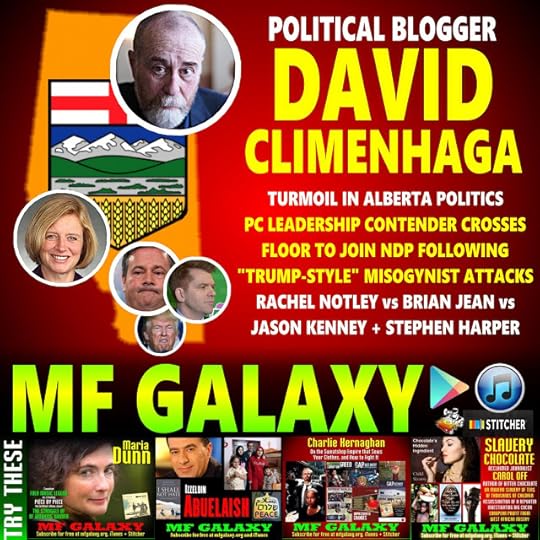
EX-PC LEADERSHIP CONTENDER’S FLOOR-CROSSING TO THE NDP GOVERNMENT“SLEAZY” CAMPAIGN TACTICS BY THE JASON KENNEY CAMPAIGN TAKE OVER THE PC PARTYFRIGHTENING MISOGYNY IN THE CONSERVATIVE MOVEMENT DESPERATE FUTURE OF WILDROSE LEADER BRIAN JEANNDP MISFIRES ON THE ROAD TO RE-ELECTIONTHE COLD REALITY OF PETRO-CAPITALISMHOW CORPORATE JOURNALISTS BENT OVER TO MAKE “OIL SANDS” POLITICALLY CORRECT
LISTEN/DOWNLOAD
If you’re not from Alberta, you may not know that the province has been, functionally, a one-party state for decades at a time. Thirty-six straight years of Social Credit rule collapsed to forty-four straight years of Progressive Conservative control.
2015 saw the unexpected election of the New Democratic Party under the leadership of Rachel Notley, leap-frogging over the right-wing splinter party Wild Rose led by former Conservative MP Brian Jean, and crushing the PC party led by former Conservative MP, the late Premier Jim Prentice.
But no one expects the NDP to continue the tradition of four decades of rule, whatever its ambitions. And if party turn-over remains a reality, then Alberta will at last have become a modern Western democracy.
It’s been a rough ride for the NDP, despite the enormous popularity of Premier Notley, herself the daughter of the former provincial NDP leader Grant Notley. After the election honeymoon was over, the reality of low oil prices, a high deficit, and the handling of Bill 6 have threatened the party’s chances of re-election.
Bill 6 sought to protect farm workers by granting them Workers Compensation Bureau coverage and thus freeing farmers from liability, but the Bill 6 consultation and communications plan met widespread criticism spearheaded by the Wild Rose opposition. The defeat of the federal NDP, the former official opposition at one point seen as the next government, further dampened hopes for the provincial party.
But it’s not only the NDP facing a difficult future. The Alberta Liberal Party was reduced to a single seat and the defeat of its former leader Raj Sherman, himself a former PC. The former PC leader Jim Prentice immediately resigned and then died in a plane crash in 2016. Wild Rose leader Brian Jean’s attempts to discipline his own MLA Derek Fildebrandt seemed to have backfired and weakened his own position.
Worse still for Brian Jean is the former Conservative MP and Stephen Harper lieutenant Jason Kenney leaving federal politics to seek the leadership of the ailing provincial PCs to collapse it into the Wild Rose, topple Jean, and become the leader.
The only two women in the PC leadership race, Donna Kennedy-Glans and Sandra Jansen, both quit after being targets of what Jansen called “Trump-style politics” from Kenney supporters, whose harassment included calling Jansen a “baby-killer.” Jansen said:
“My social media has been filled with filth, my domain name purchased to direct people to smear pieces on me and … the final straw… Insults were scrawled on my nomination forms. Volunteers from another campaign chased me up and down the hall, attacking me for protecting women's reproductive rights, and my team was jeered for supporting children’s rights to a safe school environment.”
The result of such intimidation? Jansen crossed the floor to join the NDP.
Joining me to analyse all the above is David Climenhaga.
From his official bio: “David J. Climenhaga is an award-winning journalist, author, post-secondary teacher, poet, and trade union communicator who has worked in senior writing and editing positions at the Toronto Globe and Mail and Calgary Herald. He holds a Masters Degree in Journalism from the Carleton University School of Journalism in Ottawa. His 1995 book, A Poke in the Public Eye, explores the relationships among Canadian journalists, public relations people and politicians.” Climenhaga blogs at AlbertaPolitics.ca.
Climenhaga is also a 4th-degree black belt in Uechi-Ryu, a traditional style of karate from Okinawa, and during the course of our conversation he and I both make reference to the Eastern martial arts.
We spoke last week on November 25 at Climenhaga’s office in downtown Edmonton to discuss the present for Sandra Jansen, the legality and morality of floor-crossings, what Climenhaga calls “sleazy” tactics of the Kenney campaign, and how in his opinion the NDP is failing to put its star player on the field in the Grey Cup of provincial politics, possibly at the cost of its own future.
LISTEN/DOWNLOAD
albertapolitics.ca
Contact: albertadiary@gmail.com
Etymology of Tory: http://www.etymonline.com/index.php?term=Tory
SUBSCRIBE FOR FREE ON iTUNES
SUBSCRIBE FOR FREE ON STITCHER
SUPPORT MF GALAXY ON PATREON
FOR MORE INFORMATION + LINKS
allowfullscreen webkitallowfullscreen mozallowfullscreen oallowfullscreen msallowfullscreen>
Published on November 15, 2016 10:40
ANTHONY Q. FARRELL ON WRITING FOR NBC’S THE OFFICE, PITCHING JOKES TO STEVE CARELL, AND WHAT IT TAKES TO SUCCEED AS A TV COMEDY WRITER (MF GALAXY 097)
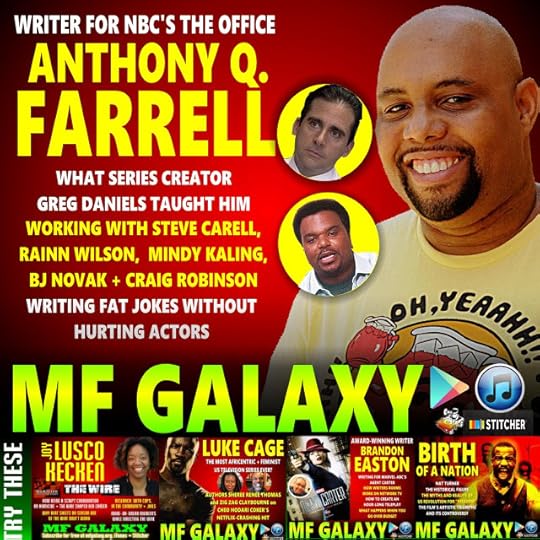
Anthony Q. Farrell is an amazing cat. He’s from Toronto, went to actual comedy school, and ended up writing for one of the most influential US comedy series ever, The Office on NBC, which is also one of my favourite shows.
He wrote two of its most enduring episodes: “Casual Friday,” in which Dunder Miflin former district manager Michael Scott returns to his old job with also former-ex-employees Pam Beesley and Ryan Howard, and the emotional “Employee Transfer,” in which Michael Scott breaks up with Holly Flax, the love of his life, during a road trip to her new home.
Farrell also served as the Canadian culture consultant on “Business Trip,” in which Michael Scott, Andy Bernard, and Oscar Martinez go to Winnipeg.
In addition to having written for two years on The Office including the Office short films “Taste the Ice Cream” and “Money Trouble,” Farrell wrote for The Thundermans, Originals, In Gayle We Trust, and was the series creator of Dwelling and The Secret Life of Boys. He also wrote and was executive story editor for the CBC sitcom hit Little Mosque on the Prairie.
Did I mention that Farrell is an African-Canadian? And given that there aren’t many African-Canadian writers who’ve hit it big in Hollywood, as soon as I knew Farrell existed, I was determined to hear what he had to say.
In today’s episode, Farrell speaks with me about his career in comedy television, including:
The impact that Office showrunner and executive producer Greg Daniels had on him as a writer and later as a showrunnerThe artistic and collegial environment for writers and actors on the show and what made it so effectiveWhat is was like working with series stars such as Rainn Wilson who played Dwight Shrute and Mindy Kaling who played Kelly Kapoor, and what it was like to pitch a joke to Steve CarellWhat it feels like to write fat jokes about actors you’ll be seeing every day at work, and why some actors stop getting comedic moments in their scriptsAnd which Office actors were most like their characters.
Farrell spoke with me by Skype on June 10, 2016.
We begin with Farrell discussing how attending comedy school gave him the training and the contacts he needed to build an outstanding career.
SUBSCRIBE FOR FREE ON iTUNES
SUBSCRIBE FOR FREE ON STITCHER
SUPPORT MF GALAXY ON PATREON
allowfullscreen webkitallowfullscreen mozallowfullscreen oallowfullscreen msallowfullscreen>
The following material is exclusive to the patrons-only extended edition of MF GALAXY. You’ll hear Anthony Q. Farrell discuss:
How he wrote the emotional episode “Employee Transfer” about Michael Scott losing Holly FlaxHow writers need to work with others to thrive professionally and emotionallyTo what extent Hollywood still ghettoises Latina and Latino, and African-American and African-Canadian writers.
Published on November 15, 2016 10:40
November 7, 2016
TOBIAS BUCKELL ON TRANSFORMING SLEEPING-PILL PLOTS INTO UNPUTDOWNABLE PAGE-TURNERS (MF GALAXY 098)
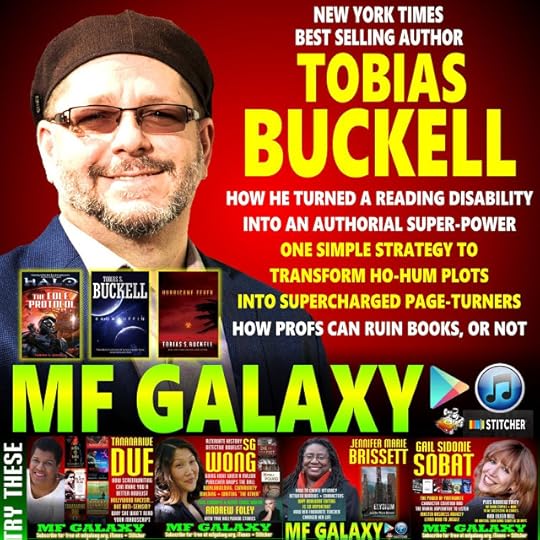
TURNING A READING DISABILITY INTO A WRITING SUPERPOWER, GROWING UP ON A BOAT, THE BIGGEST SIN OF LIT ACADEMICS
LISTEN/DOWNLOAD
Called “Violent, poetic and compulsively readable” by Maclean’s, science fiction author Tobias S. Buckell is a New York Times Bestselling writer born in the Caribbean. He grew up in Grenada and spent time in the British and US Virgin Islands, and the islands he lived on influence much of his work.
His Xenowealth series begins with Crystal Rain. Along with other stand-alone novels and his over 50 stories, his works have been translated into 18 different languages. He has been nominated for awards like the Hugo, Nebula, Prometheus, and the John W. Campbell Award for Best New Science Fiction Author. His latest novel is Hurricane Fever, a follow up to the successful Arctic Rising that NPR says will ‘give you the shivers.’
He currently lives in Bluffton, Ohio with his wife, twin daughters, and a pair of dogs. He can be found online at www.TobiasBuckell.com
Buckell spoke with me about:
Growing up on a boat with TV but with a literal boatload of books
The impact of Arthur C. Clarke and Isaac Asimov on his young imaginationThe significance of foundational adventure novelist African writer Alexandre DumasUsing a 23+Me genetic test to uncover stunning revelations about his familyHow he turned his reading disability into an authorial superpowerHow to supercharge a sleeping-pill plot into an electrifying page-turnerHow not to end a chapterReasons for academic bias against discussing the craft of entertainment LISTEN/DOWNLOAD
tobiasbuckell.com
SUBSCRIBE FOR FREE ON iTUNES
SUBSCRIBE FOR FREE ON STITCHER
SUPPORT MF GALAXY ON PATREON
FOR MORE INFORMATION + LINKS
allowfullscreen webkitallowfullscreen mozallowfullscreen oallowfullscreen msallowfullscreen>
Published on November 07, 2016 12:08
BRANDON EASTON ON WRITING FOR TV’S AGENT CARTER AND THE ART, ECONOMICS + POLITICS OF WRITERS ROOMS (MF GALAXY 096)
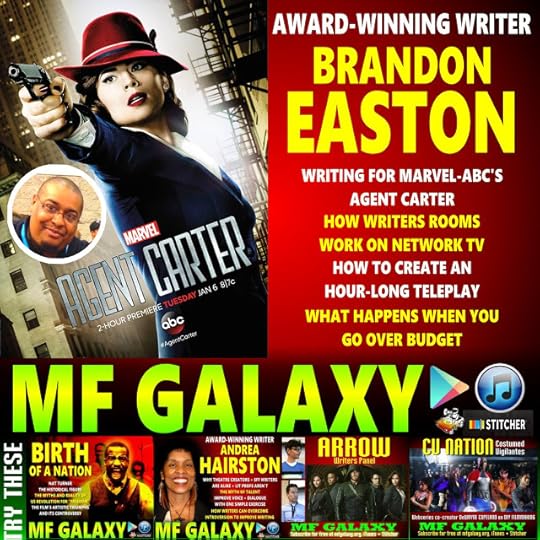
MAINTAINING INTEGRITY IN TV WRITING WHILE BEING A TEAM PLAYER, THE ROLES OF SHOW RUNNER AND STAFF WRITER, THE IMPORTANCE OF CHEMISTRY, HOW TO BREAK A SCRIPT, WHAT HAPPENS WHEN YOU GO OVER BUDGET
Published on November 07, 2016 12:08
October 25, 2016
ANDREA HAIRSTON ON WHY PLOT ISN’T A DIRTY WORD, WHAT THEATRE CAN TEACH NOVELISTS (MF GALAXY 092)
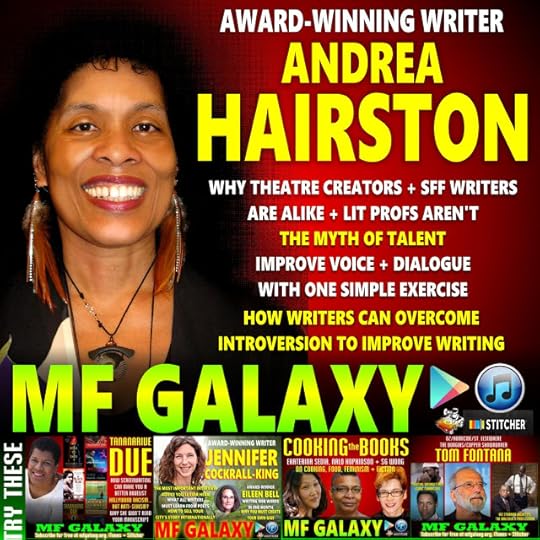
WHAT THEATRE + SFF HAVE IN COMMON, ULTIMATE WORKAROUND FOR INTROVERT WRITERS TO IMPROVE VOICE + DIALOGUE
LISTEN/DOWNLOAD
Andrea Hairston is amazing. She’s a novelist, essayist, playwright, and the Artistic Director of Chrysalis Theatre. Any science fiction plays in the bunch? Let’s see—how about Soul Repairs, Lonely Stardust, Hummingbird Flying Backward, Dispatches, and Archangels of Funk.
But who’s produced her plays? Oh, only Yale Rep, Rites and Reason, the Kennedy Center, Stage West, and US public radio and public television.
Can she translate German plays into English? Yup.
Any awards? Just a few… for playwriting and directing awards: a National Endowment for the Arts Grant to Playwrights, a Rockefeller/NEA Grant for New Works, an NEA grant to work as dramaturge/director with playwright Pearl Cleage, a Ford Foundation Grant to collaborate with Senegalese Master Drummer Massamba Diop, a Shubert Fellowship for Playwriting, and a Massachusetts Cultural Council Fellowship for 2003.
What about books? Well, there are Redwood and Wildfire, winner of the 2011 Tiptree Award and the Carl Brandon Kindred Award, and Mindscape, shortlisted for the Phillip K Dick and Tiptree Awards, and winner of the Carl Brandon Parallax Award. Plus the collection Lonely Stardust, and her play Thunderbird was published in the SFF drama anthology Geek Theater.
Okay, we get it. Except there’s also teaching and literary criticism: she’s the Louise Wolff Kahn 1931 Professor of Theatre and Afro-American Studies at Smith College, and she won the International Association of the Fantastic in the Arts Distinguished Scholarship Award for outstanding contributions to the criticism of the fantastic.
So what’d we talk about by Skype on September 12, 2016?
Why SFF novelists and playwrights appreciate plot in a way that literary writers and academics almost never doWhat a Drama department offers students, teachers, and writers that they can’t get anywhere elseWhy there’s liberation in understanding that talent is a mythHow any writer can improve dialogue by using the standard toolbox of playwrights
Check her website here.
And if you want to hear all the amazing stuff she told me about how her favourite teachers changed her life, and how, then just sign up on Patreon for a buck or more per show.
LISTEN/DOWNLOAD
SUBSCRIBE FOR FREE ON iTUNES
SUBSCRIBE FOR FREE ON STITCHER
SUPPORT MF GALAXY ON PATREON
FOR MORE INFORMATION + LINKS
allowfullscreen webkitallowfullscreen mozallowfullscreen oallowfullscreen msallowfullscreen>
Published on October 25, 2016 19:17
August 12, 2016
COOKING THE BOOKS - FOOD, SFF + FEMINISM (MF GALAXY 089)
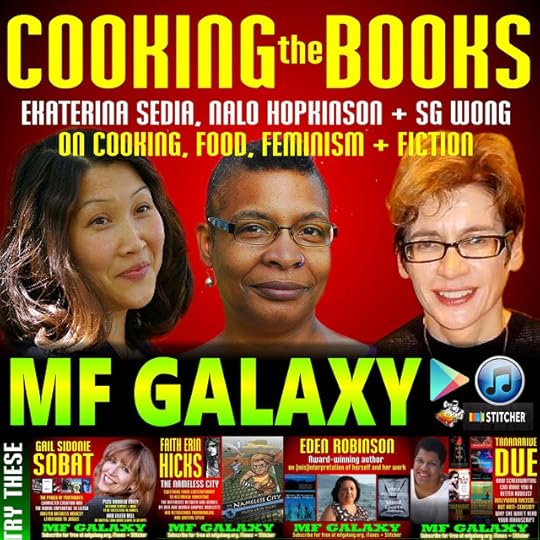 SFF NOVELISTS NALO HOPKINSON, EKATERINA SEDIA, SG WONG + MINISTER FAUST ON WHY THEY WRITE ABOUT FOOD WHILE SO FEW NOVELISTS DO, POWER DYNAMICS IN FOOD CULTURE, FUTURE FOOD TECH + CYBORG BODIES
SFF NOVELISTS NALO HOPKINSON, EKATERINA SEDIA, SG WONG + MINISTER FAUST ON WHY THEY WRITE ABOUT FOOD WHILE SO FEW NOVELISTS DO, POWER DYNAMICS IN FOOD CULTURE, FUTURE FOOD TECH + CYBORG BODIES
LISTEN/DOWNLOAD
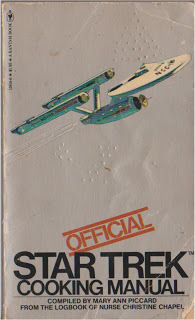 I bought my first cookbook when I was about 8 or so. These scans are from my original copy.
I bought my first cookbook when I was about 8 or so. These scans are from my original copy.
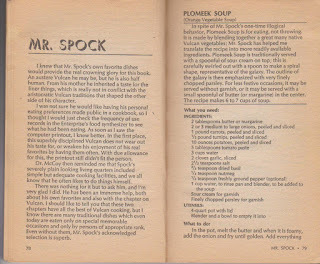
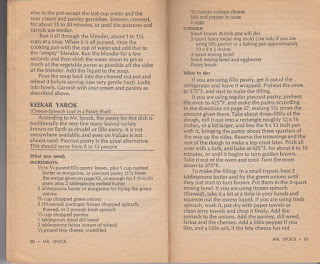
To be alive is to eat. To enjoy life is to eat. To meet with family and friends and reminisce and plan the future is to eat. And of course, all of human culture, in one way or another revolves around our basic need to stay alive through producing, consuming, and loving food.
So why do so few novelists, poets, lyricists, and other writers talk about food in their work?
I’ve been cooking since I was a kid and have always loved everything about acquiring, making, and consuming food, and in recent years I’ve become an enthusiastic and productive gardener. I’ve relished (ba-dum-ching) my conversations with other people, but especially other writers, about food. This episode features the sparkling ideas about food, culture, science, feminism, social justice, technology, and more of three delightful human beings and celebrated writers:
SG Wongis the creator of the Lola Starke hardboiled detective series (Die on Your Feet, In For a Pound, and Devil Take the Hindmost), set in Crescent City, California, in an alternate history in which China colonised North America. An Arthur Ellis Award finalist, Wong is also a sparkling stalwart of Edmonton’s literary scene as an organiser of writer conferences. She’s one of those outstanding individuals whose endless energy benefits everyone in the community.
Ekaterina Sedia is the author of The House Of Discarded Dreams, The Secret History of Moscow,and The Alchemy of Stone. She’s a short story writer who also occasionally edits anthologies, and was an interim non-fiction editor for ClarkesworldMagazine in the fall of 2008. She blogs television, books, fashion, food, and even cats, with a focus on the intersection between fashion industry and feminism. She encourages readers to contact her at katsedia@hotmail.com.
Nalo Hopkinson, whom the Routledge Companion to Literature and Science calls a luminary in the science fiction community. She is widely known for her Africentric science fiction and fantasy novels exploring the experiences and cultures of African peoples in the Caribbean and ultimately into the galaxy. She’s the author of ten celebrated books including Skin Folk, Sister Mine, The New Moon’s Arms,and her explosive debut Brown Girl in the Ring, a dystopian science fiction adventure set in near-future Toronto featuring an African-Canadian heroine and the orisha gods of Nigeria and Benin.
The bonus edition for Patreon subscribers features an extra 40 minutes of conversation, so sign up, why doncha?
SUBSCRIBE FOR FREE ON iTUNES
SUBSCRIBE FOR FREE ON STITCHER
SUPPORT MF GALAXY ON PATREON
allowfullscreen webkitallowfullscreen mozallowfullscreen oallowfullscreen msallowfullscreen>
Bean Pie, My Brotha?
Sister Lani Shabazz invented bean pies
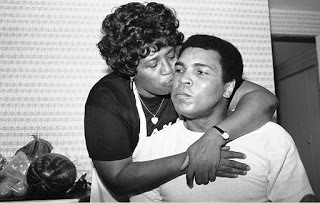
RECIPES!
Corn congee
NALO HOPKINSON
SQUASH SOUP

Ingredients
1 medium winter squash, perhaps 4" in diameter. I prefer the dry, sweet squashes such as kabocha, turban or hubbard. But you can substitute pumpkin or any other winter squash, such as acorn or butternut. I advise against using canned pumpkin. It just doesn't taste as good.1 medium onion.2 tablespoons butter. Can substitute w another flavorful oil, such as coconut, palm, or hazelnut. I'm not sure the taste of olive oil would work.
1/2 teaspoon fresh grated nutmeg, or 1 teaspoon fresh grated ginger. As with the pumpkin, fresh is best.Flaked, dried chilis to taste.Salt to taste.Soup pot or heavyish saucepan with a lid, plus enough water to cover the squash as it's boiling.
Optional; basil leaves and plain yogourt, as garnish.
Directions Rinse and peel the onion. Cut in half, put in soup pot.
Rinse the squash. Cut in half, remove seeds. Chop the squash into large pieces and put in the pot. I generally leave the rind on until later.
Cover the squash & onion with water. Put the lid on the pot. Bring to a boil, then simmer until the squash and onion are soft enough to puree.
Turn the heat down as low as possible. You want to keep the water warm, but not boiling.
With a fork or slotted spoon, remove the onion and squash. Put the onion into a food processor or blender.
While you're letting the squash cool a bit, put the butter, dried chilis, and nutmeg or ginger into the simmering water.
With a spoon, scrape the squash flesh free of the rind. Discard the rind and add the squash to the onion.
Add some of the liquid from the pot to the squash and onion. Not too much! There's nothing quite like steaming hot squash puree erupting from your blender all over your hands, face, and anything in a 3-foot radius. Heed the voice of experience.
Puree the squash and onion. Return it to the pot. Stir, taste. Add salt if you like.
Turn the heat off.
Optional; garnish with the basil leaves and/or a dollop of plain yogourt.
Serve. Will probably serve 3-4 people as a meal starter
Variation To make this into a main course, I cook flat rice noodles, mung bean noodles, or plain dumplings (flour, water, salt, egg) in the water after I've removed the squash and onion. I might also add basil leaves at this stage. Then I just leave them in and continue with the rest of the recipe.
SG WONG
Saskatoon Berry JamYield: approx. 2 cups / 2 x 250ml jam jars

Ingredients
Saskatoon berries 4 cupsSugar 2 cupsWater ½ cupLemon juice ½ lemon’s worthLemon peel ½ lemon’s worth
Method
Crush berries in heavy-bottomed pan. A Dutch oven works nicely.Heat on medium until juice begins to seep out.Add water and sugar, stirring to incorporate.Bring to boil, stirring constantly.Add lemon juice and peel, incorporating fully.Boil or simmer to reduce liquid and thicken. (About 15-20 minutes)Ladle into sterilized jars and continue with usual canning methodology to ensure long-lasting storage.
Notes
This recipe is adapted from ATCO’s Blue Flame Kitchen. I halved the original sugar content.You can customize the texture in step 1. Crush more or less depending on your preference for whole berries in the jam.To make this a jelly, you can strain before step 7.
I sterilize my jars like this:Submerge jars & rings in a pot with tepid/room temp. waterBring to boil & boil 10 minutes (neverless; more is ok)Turn off heat & place flat lids and tongs, etc. into hot waterLet sit for at least 10 minutesI don’t do a hot water bath after I fill the jars. I let them sit, upside down, on a cooling rack on the counter. I also fill to the brim. Most instructions will tell you to leave a ¼ inch.The jams are safe for long-term storage when you hear them pop, or when the lids don’t click when you press down. This means a vacuum seal has been created.
EKATERINA SEDIA: RECIPE + FOOD PHOTOGRAPHY
Dessert-for-breakfast PB Banana Mug Cake
Ingredients
1 banana1 flax egg (use real one if not vegan)½ tablespoons peanut butter (almond or any nut butter work just as well)1 tablespoons almond or buckwheat flour, or protein powder (optional);½ tsp baking powderPinch of saltDash of vanilla extractOther spices to taste
Directions
Mash banana with a fork. Add other ingredients to the mashed banana. Mix everything in a mug to form a mostly smooth batter (it should fill mug to 2/3-3/4). Bake at 350 for 20-30 min or until the top is golden brown. Let stand for 5 min and serve with honey, berries, whipped coconut cream or just plain.










Published on August 12, 2016 11:09
June 29, 2016
SG WONG ON WORLD-BUILDING, HELPING WRITERS GET PAID, AND GOING INDIE WHEN YOUR MAJOR PUBLISHER DOES NOTHING FOR YOU (MF GALAXY 084)
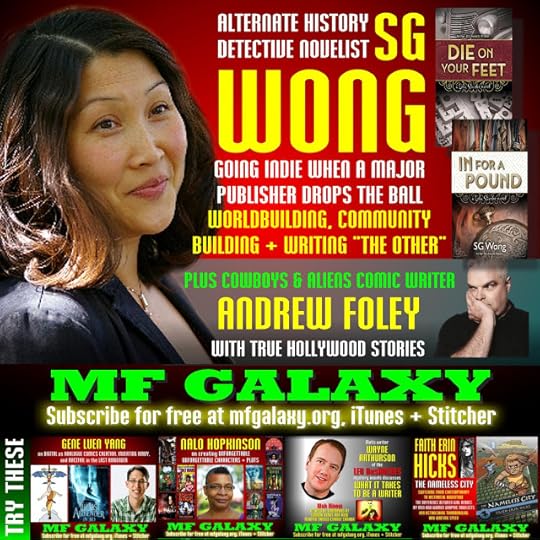
WRITING HARDBOILED DETECTIVE FICTION IN ALTERNATE HISTORY CRESCENT CITY, VALUING YOUR OWN WORK, AND HOW TO WRITE “THE OTHER” RESPECTFULLY
LISTEN/DOWNLOAD
SG Wong is the creator of the Lola Starke hardboiled detective series set in Crescent City, California, in an alternate history in which China colonised North America. Arthur Ellis Award-finalist Wong is also a sparkling stalwart of Edmonton’s literary scene as an organiser of writer conferences. She’s one of those outstanding individuals whose endless energy benefits everyone in the community.
In this episode of MF Galaxy, SG Wong discusses:
The impact of going indie on her work and creativityHow writers must view their own workUnder what conditions writers should conduct seminars in schoolsHer approach to world building her magnificent alt-earth setting of Crescent City, andHow writers should approach writing characters who possess an ethnic, racial, or other identity unlike their own.
Along the way, Wong refers to Gail, meaning the novelist, writing teacher, and literary organiser Gail Sidonie Sobat. SG Wong spoke with me live onstage at Authorpalooza 3 at Devaney’s Pub in Edmonton in April, 2015.
SG Wong reads from Die On Your Feet
At Authorpalooza 1 from October 2014, I spoke with comic book and video game writer Andrew Foley. Andrew Foley writes for Beamdog Game Studio in Edmonton, and wrote the graphic novels Parting Ways(illustrated by Scott Mooney and Nick Craine) and Done to Death, illustrated by star-artist Fiona Staples. But to some, Foley is best known as the writer of the graphic novel Cowboys & Aliens, and that’s the subject of “Andrew Foley’s True Hollywood Stories.”
Andrew Foley Writes Things (blog)
allowfullscreen webkitallowfullscreen mozallowfullscreen oallowfullscreen msallowfullscreen>
SUBSCRIBE FOR FREE ON iTUNESSUBSCRIBE FOR FREE ON STITCHERSUPPORT MF GALAXY ON PATREONFOR MORE INFORMATION + LINKS
Published on June 29, 2016 19:07
SPOKEN WORD ARTIST, TV STAR, INTEL-NIGERIA SPOKES-POET + CIVIL ENGINEER TITILOPE SONUGA (MF GALAXY 082)
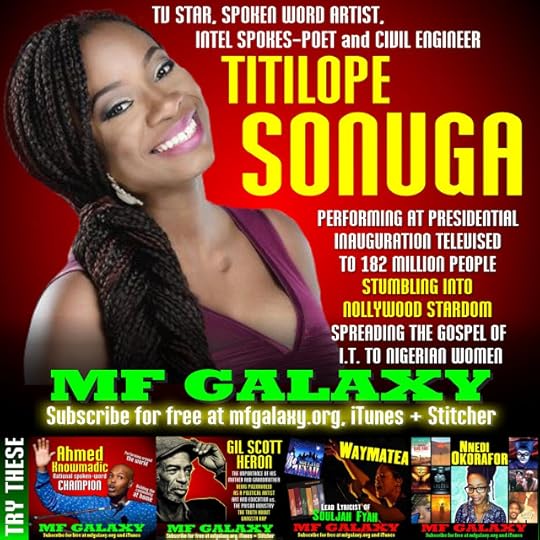
PERFORMING AT PRESIDENTIAL INAUGURATION, REPPING INTEL-NIGERIA’S SHE WILL CONNECT CAMPAIGN, WHY ARTISTS SHOULD EMBRACE SCIENCE + TECHNOLOGY
LISTEN/DOWNLOAD
The “brain drain” from Africa’s 55 countries is the cause of much lamentation—sending legions of doctors, engineers, and other professionals to serve the West at the exact moment they can lead economic growth at home.
But Titilope Sonuga is part of the unheralded but very real “brain train,” the expatriates who are moving back home with education, skills, and networks they’ve gained abroad.
Sonuga has ridden that train. She’s lived on two continents, had a career in Canada as a civil engineer, co-founded Edmonton’s thriving Breath In Poetry performance collective and hit stages with her work across the country, relocated to her family’s home country of Nigeria, become an Intel spokesperson to encourage women to use information technology, performed her verse at the inauguration of Nigeria’s president, and ascended to television stardom in Nigeria.
Not bad for a thirty-year-old, huh?
In today’s episode of MF GALAXY, Titilope Sonuga discusses:
How she came to perform at the presidential inauguration for a country of 180 million peopleHer approach to rehearsals for spoken-word poetry performances and how she addresses anxietyThe purposes of Intel Nigeria’s campaign She Will Connect, and why the tech giant asked her to be its spokespersonThe many reasons that artists should embrace science and technology, and how her engineering mindset lives in her poetry aesthetics, andThe perks of getting famous by being a star on one of Nollywood’s most beloved television shows.Sonuga spoke with me by Skype from her apartment in Lagos, Nigeria on November 15, 2015.
SUBSCRIBE FOR FREE ON iTUNES
SUBSCRIBE FOR FREE ON STITCHER
SUPPORT MF GALAXY ON PATREON
FOR MORE INFORMATION + LINKS
allowfullscreen webkitallowfullscreen mozallowfullscreen oallowfullscreen msallowfullscreen>
titilope.ca
okayafrica: “Why You Should Be Watching Nigeria’s Gidi Up”http://www.okayafrica.com/video/niger...
Gidi Up, Season 2, Episode 11: Shots Fired
Titilope Sonuga – She Will Connect campaign for Intel Nigeria
Titilope Sonuga at TEDx Edmonton
Published on June 29, 2016 18:25



